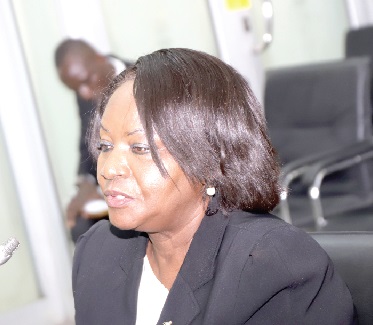
Make determination on death penalty- Supreme Court nominee proposes to Parliament
A nominee for the Supreme Court, Justice Barbara Frances Ackah-Ayensu, has urged Parliament to examine the existing laws on death penalty and make a determination on its removal or otherwise.
She said the prisons had a number of people on death row because their death warrant had not been signed.
“For a very long time there have been no executions and so there may be the need to review the situation,” the nominee said when she appeared before the Appointments Committee of Parliament in Accra yesterday for vetting.
Justice Ackah-Yensu is the first of four Justices the President has appointed to the Supreme Court.
The rest are Justice George Kingsley Koomson, Justice of the Court of Appeal; Justice Samuel Kwame Adibu Asiedu, Justice of the Court of Appeal, and Justice Ernest Yao Gaewu, Justice of the High Court.
Response
Responding to a question on whether capital punishment must be abolished or not, Justice Ackah-Yensu said as a Christian, she did not believe in “life for life”, but that the laws of the land were paramount.
“I am bound to follow the law as a judicial officer, based on the evidence before me, but speaking as a person and Christian, I do not believe in life for life,” she added.
The nominee, however, said if her conviction and her faith were at variance with the law, the circumstances of the case would be a determinant, adding that she would recuse herself if the issue was something she felt so strongly about.
On issues of gay rights, she said “I will deal with them on a case by case basis because most of the time we apply the law and not personal morality against the law”.
Responding to a question on the dwindling trust of the citizenry in the judicial system, Justice Ackah-Yensu said she disagreed with that perception and called for a scientific way of determining the loss of confidence in the system as a nation.
She said when allegations were made against the Judiciary, people did not usually distinguish between the Judicial Service and the Judiciary, saying a line must be drawn between the two.
On alternative dispute resolution (ADR), said it was unfortunate that although the law supported the establishment of centres for its implementation, the centres were not being set up.
Legal Council
Answering a question on the directive by the General Legal Council (GLC) to students not to request for the re-marking of their examination papers, among others, Justice Ackah-Yensu said: “I cannot conclude that the undertaken is unconstitutional, neither can I say it is arbitrary.”
She said since there was a provision for aggrieved persons to take the matter up, she believed it was appropriate to do so.
And on whether the GLC must be reformed to make it purely administrative, she said the issue needed a broad stakeholder consultation.
On the need to ensure that issues concerning elections ended with the Electoral Commission to minimise the number of electoral petitions at the apex court, she said: “The possible situation should be that all should end at the EC, but every citizen has a constitutional right and, therefore, one cannot stop anyone from going to court.”
Justice Ackah-Yensu, however, added that “if we feel there must be some laws to guide the EC, it's up to the legislature”.
Unanimous rulings
On her view on the unanimous rulings during the recent election petition at the Supreme Court, the nominee said the perception was due to a lack of understanding of how the courts work.
According to her, she would want to be remembered for ground-breaking decisions at the Supreme Court as a judge with integrity and fairness who is also fearless and courageous.
Justice Ackah-Yensu further said she did not believe that judgments necessarily went in favour of the appointing authority.
“I don't have access to the data that went into these findings, but suffice it to say that from my experience, I do not think decisions of judges necessarily go in favour of the appointing authority. Some are coincidents,” she said.
